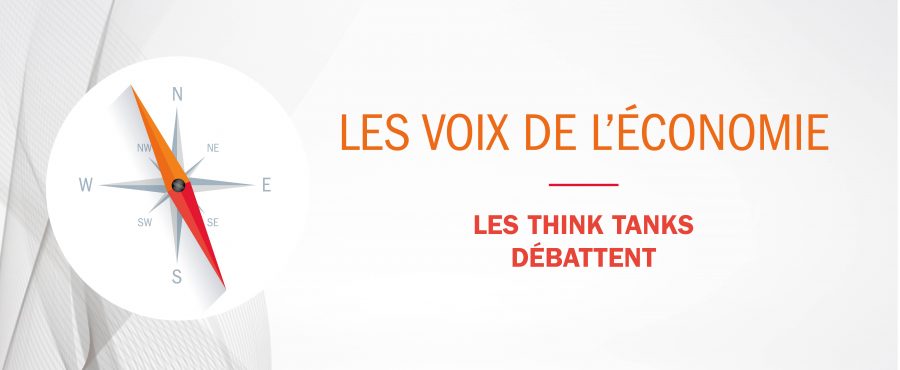Les Voix de l’économie

What New Deal in the age of technological evolution ?
In parallel to the “Aix-en-Provence Economic Meetings”, 14 think tanks are organizing an international conference to tackle – without any taboo – the major political issues related to current and future disruptions.
Friday, july 6th 2018 from 3:00pm to 5:30 pm
Aix-Marseille Université – Site Schuman, 3 avenue Robert Schuman – Amphi 7
Download the Program
Moderation : Eric le Boucher (les Echos) et Emmanuel Lechypre (BFM)
3:00pm: Are major technological advances also political breaks ?
Gilles Finchelstein (Fondation JeanJaures), Dominique Reynié (Fondapol) and Cyril Zimmermann (Acsel).
3:20pm: In this world of technological breakthroughs, will work still exist ?
Studies are conflicting regarding predictions of job destruction as a result of robotization and artificial intelligence. But how many new jobs can also be created?
The Digital Revolution is changing the way people work, so all needs to be rethought; forms of collaboration, legal links between employers and employees, skills, training, coaching, etc. How to give back a horizon while worry is gaining the world of work?
Speakers: Vincent Charlet (La Fabrique de l’Industrie) and Paul Allibert (Institut de l’Entreprise)
Witness: Fabienne Arata (Linkedin)
3:40pm: Are the announced upcoming technological breakthroughs fake news ?
Speakers: Agnès Audier (Boston Consulting Group) and Joelle Toledano (Paris-Dauphine University)
3:50pm: Will major public institutions survive technological disruptions ?
School, central banks, social protection, culture and even military – will these institutions be replaced by new technology? Blockchain is already replacing the State or central banks for certain transactions. Artificial intelligence is reshaping education. Tomorrow, transhumanism will change the systems of care for advanced economies. How far can this movement go?
Speakers: Laurent Bigorgne (Institut Montaigne) and Thierry Pech (Terra Nova)
Witness: Nathalie Collin (Groupe La Poste)
4:10pm: In 10 years will Europe be at the top of the race ?
Facebook, Google, Amazon, Alibaba, Tencent, Apple have revolutionized our lives while taking the place of European champions like Nokia or Alcatel. Today, if Europe seems destitute and without an international champion, what means must Europe have to make its Big Techs emerge? Is the digital single market or the single capital market the best way to finance innovation?
Speakers: Françoise Benhamou (Cercle des économistes) and Emmanuel Jessua (Coe-Rexecode)
Witness: André Loesekrug-Pietri (J.E.D.I)
4:30pm: What look for 21st century democracies ?
Fake news, fraudulent use of data, foreign interference, and social networks strength – for the past two years, digitalization has disrupted politics. Citizens are taking the floor to reshape institutional frameworks of the last 60 years. Ultimately, the notion of trust is what now lies at the heart of these issues and upsets the current balances of power. But how far will this go?
Speakers: Alexandre Jost (Fabrique Spinoza), Michel Rousseau (Fondation Concorde) and Marie-Laure Sauty de Chalon (Les Gracques)
Witness: Carla Aerts (UCL education)
4:50pm: Who will rule the world, states or big techs ?
The debate is intense in Europe and elsewhere regarding regulation and ways it shouldbe put in place to counter monopolistic effects from big techs. Taxation, competition regulation, or European data protection legislation, are all tools meant to protect but also frame and adapt economic and social frameworks to such novelties. In parallel, big techs are aware of their impact and are increasing the number of initiatives; funding of research institutions on artificial intelligence, support for small businesses and SMEs, foundations etc. What global governance must be put in place to ensure harmonious development?
Speakers: Olivier Sichel (The Digital New Deal Foundation) and Lucas Léger (GenerationLibre)
Witness: Barry Lynn (Open Markets Institute)
5:10pm: Biotechnologies, transhumanism, genetics, can we picture a global partnership ?
Reality seems to join the wildest scenarios imagined by science fiction authors. As prophets of transhumanism promise us immortality, large groups are investing astronomical sums to create the future human. Augmented memory, replaced organs, genetic modifications… But some are sounding the alarm: will we be surpassed by our own creations? Should not we define a global ethic in the face of new techniques linked to genetic manipulation? Once again, global governance for these issues seems necessary and urgent!
Witness: René Frydman (Doctor specialized in medically assisted reproduction)
5:30pm: Conclusion : Eric Hazan (McKinsey) and Jean-Hervé Lorenzi (Le Cercle des économistes)




















































































